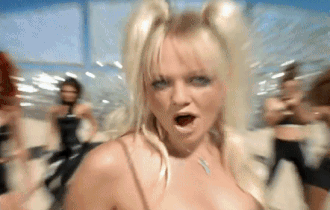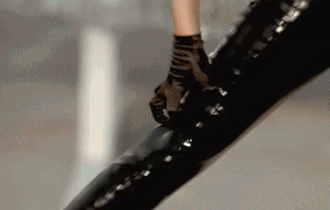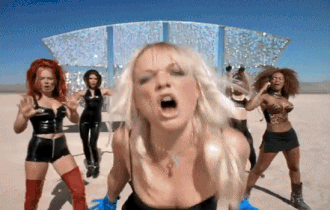Released: 14th October 1996
Writers: Spice Girls / Eliot Kennedy
Peak position: #1
Chart run: 1-1-2-2-9-11-13-18-13-17-14-23-42-56-48-54-72
Billboard Hot 100 chart run: 5-3-3-3-5-6-6-7-8-15-13-17-18-23-24-32-33-35-41-44-46
After the whirlwind success of Wannabe, there was little doubt that whatever the Spice Girls released next would be a hit in the UK. Say You’ll Be There thus delivered on the hype in every regard, confirming that girl power wasn’t going anywhere.

In principle, Say You’ll Be There should have been the epitome of a difficult second single, such was the scale and enduring impact of Wannabe (it remained in the top 75 until December 1996 – six months after entering the chart – and didn’t reach #1 in America until February 1997). Yet, the Spice Girls launched with such a clear vision of what they wanted to achieve and how they’d do it that Say You’ll Be There was a perfectly judged follow-up. Indeed, if Simon Fuller and Virgin Records had their way, this would’ve been the group’s debut single (Love Thing was also mooted). However, the Spice Girls were adamant that Wannabe had to the song that launched them, and their instinct was entirely correct.

Yet, it’s easy to see why the label initially favoured Say You’ll Be There since they were tasked with trying to pitch the Spice Girls in what was – at the time – a mostly male-dominated music industry. The track has a slightly more R&B/funk-leaning edge, and though it doesn’t sound like a song Eternal would’ve recorded, it could conceivably have been marketed as a poppier spin on the sort of material they’d enjoyed success with. But part of what made Wannabe so impactful is the Spice Girls didn’t try to be a version of something that already existed. They were doing things on their own terms, and Say You’ll Be There continues that ethos.

The track was co-written with Eliot Kennedy and produced by Absolute (Andy Watkins and Paul Wilson), showcasing the counterpart creative team to Richard “Biff” Stannard and Matt Rowe, who – between them – shaped the Spice Girls’ debut album, Spice. On their 2007 Greatest Hits compilation, Say You’ll Be There was also credited to Jonathan Buck (Jon B.) due to melodic similarities with the song What U R 2 Me, which he wrote and produced for US R&B group After 7’s third album – Reflections – in 1995. There’s a fleeting resemblance in the chorus between: “Baby, what you are to me, no one else can be…” and: “I’m giving you everything, all that joy you bring…” in Say You’ll Be There but the two songs are very different overall. It’s certainly not among the most egregious instances of unintentional plagiarism. When Spice was reissued for its 25th anniversary, the liner notes made no reference to Jonathan Buck, so it’s unclear what the official stance is now.

One of the reasons Say You’ll Be There works so well as a follow-up to Wannabe is that having established the rambunctious energy of the Spice Girls and what they stood for, the track provides a more representative introduction to how the group dynamic functioned musically (not least because Victoria Beckham has some audible vocal input this time). Even the arrangement of the intro, where Melanie C cuts in with: “Ah, say you’ll be there” before an abridged version of the chorus (“I’m giving you everything, all that joy can bring, this I swear”), is more consistent with the way her voice quickly emerged as the one to riff, ad-lib and punctuate their material. The track isn’t devoid of the group’s infectious raucousness; a chant of: “I’ll give you everything, on this I swear, just promise you’ll always be there” in the middle eight elicits that same mood. However, all of the Spice Girls’ individual traits are more overtly present in Say You’ll Be There, and it’s one of the finest examples of what made them tick.

While Wannabe‘s ‘friendship never ends’ mantra defined the Spice Girls, it was part of a broader sentiment about the group setting the terms of a romantic relationship. They hone in on that theme for Say You’ll Be There; indeed, the first verse links cohesively: “Last time that we had this conversation, I decided we should be friends…”. The sweetness in Emma Bunton’s tone disguises a jaded impatience (“…But now we’re going ’round in circles, tell me will this déjà vu never end, oh…”) that is expressed more outspokenly by Melanie B, who crashes her way into the track: “And now you tell me that you’ve fallen in love, well I never ever thought that would be…”. There’s a real sense of contrasting personalities coalesced around a shared attitude. That extends further into the second verse where Geri Halliwell’s wordplay: “If you put two and two together, you will see what our friendship is for, if you can’t work this equation, then I guess I’ll have to show you the door”, fits her role as the profound thinker of the group. It’s also fairly typical of the lyrical witticisms that characterised her songwriting style when she launched a solo career years later.

Perhaps the most significant aspect of Say You’ll Be There in terms of individual contributions is Victoria Beckham’s. Her absence from the writing session for Wannabe meant she didn’t have a solo on the track. That didn’t go unnoticed, particularly by critics. She has a more prominent role here on the pre-chorus: “But any fool can see they’re falling, I gotta make you understand”, and it’s a good fit for her voice. Victoria Beckham has never claimed to be the best singer. Still, her considered, matter-of-fact delivery – complemented by the twinkling production – is thoroughly pleasant and striking in its modesty compared to the more bombastic performances around it.

Say You’ll Be There’s chorus: “I’m giving you everything, all that joy can bring, this I swear, and all that I want from you, is a promise you, will be there”, is far less anarchic than its predecessor, although, in fairness, that’s one of the reasons the Spice Girls fought for Wannabe as their debut single. However, it’s deceptively catchy and perhaps even a tad underappreciated compared to the group’s more audaciously bold moments like Who Do You Think You Are or Spice Up Your Life. Yet, the chorus stamps its identity in the group’s back catalogue as the first where Melanie C flexes her vocals to create a climactic finale. She tears through the track: “I’m giving you everything (I’m giving you everything), all that joy can bring (all that joy can bring), this I swear (yes, I swe-e-ear), and all that I want from you (all that I want from you), is a promise you (want you to promise to), will be there (always be the-e-ere)” with powerhouse, singalong ad-libs that became one of the most distinctive elements of the group’s material.

While it’s fitting that the Spice Girls are the focus of Say You’ll Be There, that also explains why their partnership with Absolute was so prosperous. There’s a lot happening in the production; bass-laden squelchy synths throb beneath the verses, while the recurring saw wave synth line is easily as recognisable as anything else in the song. Then there’s the harmonica solo, performed by Judd Lander – who’s also responsible for the iconic melody on Culture Club’s Karma Chameleon (though he’s done much more besides) – which is as sublime as it is gleefully preposterous. The instrumental crafted by Absolute shows how much they understood and matched the energy of the Spice Girls. Say You’ll Be There is, thus, a thoroughly coherent collective effort. However, in hindsight, it’s also possible to see and appreciate how the song is filled with the idiosyncrasies each group member of the group developed – to varying degrees – as their careers evolved. Not that anyone, at this point, was contemplating solo ambitions.

The accompanying music video was filmed in the Mojave desert, drawing inspiration from movies like Pulp Fiction (specifically the in-universe Fox Force Five TV show) and Faster Pussycat! Kill! Kill! Not that either reference would be apparent to most of the Spice Girls’ younger fanbase. It opens showing a vintage Burgermeister rotating UFO with Burgie! written on the underside, a reference to Burgie Beer (the brewery had long since closed by 1996; even so, it’s somewhat unconventional for a pop act to directly publicise an alcoholic beverage, even a defunct one). The video then commences with a credit sequence, introducing each of the Spice Girls playing an alter-ego: Katrina Highkick (Melanie C), Trixie Firecracker (Geri Halliwell), Kung Fu Candy (Emma Bunton), Midnight Miss Suki (Victoria Beckham) and Blazin’ Bad Zula (Melanie B). It’s interesting that the group dabbled with adopting nicknames based loosely on their personalities at precisely the same time as Top Of The Pops Magazine came up with their own – Sporty, Ginger, Baby, Posh and Scary – that ended up sticking to such an extent they quickly became canon. There wouldn’t have been any way to foresee that and incorporate them into Say You’ll Be There at this stage. Still, it feels like an aspect of the video that might’ve existed differently had it been conceptualised later.

Nonetheless, the video uses those alter-egos as the basis for the more dynamic sequences in Say You’ll Be There, as each member uses their martial arts skills to smash vials of water by throwing weapons (or shooting laser guns). In between are shots of the Spice Girls performing to the camera in different line-ups against a shimmering backdrop. A femme fatale angle is established when two men happen across the Spice Girls in the desert; one ends up bound to the floor with a bra covering his eyes, while the other finds himself strapped to the roof of a car. There’s no stated narrative aim for the group’s actions, but their underpinning philosophy was so firmly established that taking it as a statement of girl power is rationale enough. Say You’ll Be There makes the most of the location; many shots are framed to include azure blue skies and mountainous landscapes, while the water that bursts from the vials glistens in the beating sun. The Spice Girls had so many strong visual moments that defined the Spice campaign; this is right up there among them and went on to win the group a Brit Award in 1997 for British Video of the Year.

There was no doubt whatsoever that Say You’ll Be There would reach #1 in the UK. The whirlwind success of Wannabe generated such hype for the follow-up that the only question was how big the follow-up would be. First-week sales of 323,645 copies made this the first Spice Girls single to debut atop the chart (Wannabe entered at #3 before climbing) and were among the highest of the year. Considerably more than any individual weekly total achieved by Wannabe, in fact. Say You’ll Be There spent a fortnight at #1 and ended 1996 as the fourth biggest-selling song of the year, with sales of 874,000 copies (so dominant was the Spice Girls’ grip on the charts that three of the top five biggest sellers of 1996 were theirs). The track also enjoyed further – record-breaking – success in America, though not until mid-1997 due to launching later than most other major territories. Say You’ll Be There entered the Billboard Hot 100 at #5 to become the highest-ever debut for a British group before climbing to the peak of #3 the following week (the record was surpassed in 2012 when One Direction’s Live While We’re Young entered at #3).

The Spice Girls’ debut album – Spice – arrived a fortnight after the release of Say You’ll Be There and topped the chart, selling 128,873 copies. It went on to spend 15 non-consecutive weeks at #1 and remained steadfast in the top five for 40 weeks. By the end of 1996, Spice had already sold 1.54 million copies, and it ultimately became the best-selling girl group album of all time in the UK, with 3.01 million copies as of 2021. When Spice was released in America in February 1997, it debuted at #6. The album eventually climbed to a peak of #1 after three months, propelled by the arrival of Say You’ll Be There. With more than five million copies sold by the end of the year, it became the best-selling album of 1997.

Though Say You’ll Be There achieved the sort of success many acts would deem a career-best (the track has now been certified for combined chart sales of more than 1.2 million copies), in the UK, it ended up sandwiched between two even bigger hits in Wannabe and 2 Become 1. The Spice Girls phenomenon is often remembered as the all-encompassing brand it became at the height of their fame, leading to unprecedented sponsorship and merchandise deals. Yet, none of that existed in 1996. The group’s popularity was driven almost entirely by how they and their music connected to audiences; both elements were crucial for that to work as well as it did. Say You’ll Be There mightn’t have been quite as big a hit if a different act performed it. That much is probably true. But equally, the Spice Girls would not have become such a global sensation if they hadn’t had material as good as Say You’ll Be There.



